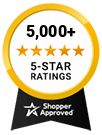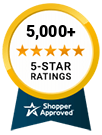Hygiene is fundamental of beauty at any age, but it presents some unique problems for many seniors. The problems associated with mobility make even the simplest tasks a dangerous undertaking. Good hygiene can also help fight a bevy of aging beauty problems such as wrinkles, seborrehoeic keratosis (brown lesions) and dry itchy patches. Many seniors become depressed, and get frustrated by the inability to maintain regular hygiene, and feel good about themselves. Here are some simple tips to keeping yourself looking and feeling your best.
Start Off Clean and Stay Safe
Daily bathing is essential in maintaining skin condition, and alleviating odors and harmful bacteria. However, many accidents happen in the shower or bath, and for seniors, the number of accidents, and their severity increases exponentially. Some ways to ensure a safer bathing experience are:
- Use non-skid mats for inside the shower or tub, and don't forget to put a mat outside the tub or shower stall as well. Typical bathroom floors are very slippery when they, or you are wet.
- Install handgrips to help you in and out of a shower or tub.
- Use a shower seat to allow yourself to take your time, and shower comfortably without getting overly tired, or risking a fall.
- Use mild soap that won't dry the skin, and rinse it off well to keep a film buildup from causing dryness and aggravate wrinkling.
It all starts with the skin
Your skin is the very foundation of your beauty, and your health is mirrored in its appearance. There are many reasons to be concerned over proper skin care as you age, and wrinkles are just one of them. Some of the most common senior beauty problems are associated with the skin's appearance.
Dry Yourself well
Dry yourself well, but gently after bathing. Water left on the body can increase the chances of bacteria buildup, especially where skin is sagging, or under the arms and between legs. Use a soft towel, and pat the skin dry to prevent tearing or bruising.
Apply Lotions and Moisturizer
After a bath is the perfect time to apply body lotions that will help restore moisture to the skin. One of the biggest issues seniors face is thinning, brittle skin. A moisturizer can rejuvenate your body, and help reduce wrinkles, brown spots, and dry patches.
Stop Smoking!
If you smoke, now is a good time to stop. It's never too late to enjoy the health benefits of quitting. Smoking is a leading cause of browning skin, and aggravates dryness and skin cracking. Quitting smoking can also help reduce age spots.
Remember your SPF!
Apply a good sun block whenever you're going to outdoors. Aging skin is much more susceptible to sun damage than it was when you were younger. If you prefer, wear long-sleeves and pants, along with a hat to protect your face when you are going to be outside. Don't forget to protect your skin against wind as well by wearing appropriate clothing when you are going out in windy weather.
Humidify Much?
Another way to help keep your skin from drying out, and to discourage wrinkling is to run a humidifier in your home. It will help keep the air from drying your skin, and irritating your sensitive nasal passages.
Dental Health is Important for Senior Health and Beauty
Whether you wear dentures, or are blessed to still have your own teeth, dental hygiene is very important to overall health and beauty. Bacteria buildup causes many serious problems for seniors, and can create blackened or discolored teeth, thickening of the gums, gingivitis and additional tooth loss.
Dentures
Seniors who wear dentures may think that those issues no longer apply to them, but bacteria buildup is an even bigger problem for denture wearers if they don't care for them properly. Diseases such as Candida develop and can spread through the system if oral hygiene is not kept up.
Brush your gums and tongue every morning, before putting in your dentures, and gargle with a good anti-bacterial mouthwash. Denture wearers tend to leave that step out, and it is the fastest way to develop oral problems. Brush and gargle again in the evening when removing the dentures. Soak your dentures in a cleansing solution nightly.
Brush 2 times a day!
Use a soft bristle brush to avoid aggravating gums or tongue. Don't forget to brush your tongue, as it's a hotbed of bacteria buildup. If brushing your tongue, even with a soft bristle toothbrush is too harsh, or causes irritation or bleeding of the tongue, use a tongue scrapper designed to remove the bacteria from the tongue. Do not neglect brushing your gums, and tongue.
Tooth brushing can present a problem for elderly individuals who have declining fine-motor skills. Make the handle of a toothbrush thicker by wrapping it with duct tape, or putting a bicycle handle pad on it so that it is easier to grip.
Don't forget to Floss
Floss at least twice a day if you still have your natural teeth. If you have dentures, remove them and brush them with a good denture toothpaste.
Regular Dentist Appointments
Get regular dental checkups. Visit your dentist any time you have loose teeth, or develop sensitivity in one or more teeth. Consult your dentist if you have lose dentures, or sore spots from lose fitting plates. Other reasons to consult a dentist immediately are if you develop pain or have bleeding in your gums or other areas, or find any lumps or swelling in your mouth.
Ask for Help
No one should ever have to go without the basics of good hygiene. If you're experiencing difficulties with any of the regular necessities don't be afraid to ask for help. If you have family available, discuss options for their assistance. When no family is available, consult your physician. Your doctor will know of local assistance programs that can help you with aides to provide daily hygiene needs, and allow you to maintain an active, and independent lifestyle.
.png)


 Canadian Dollar
Canadian Dollar  US Dollar
US Dollar 






























.png)
